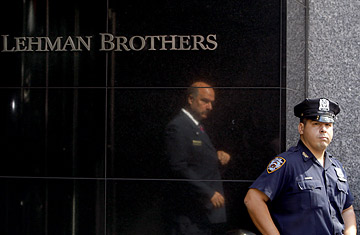
Lehman Brothers headquarters in New York on Monday.
There's been talk of a potential failure of Lehman Bros. for months, and the investment bank already had a near-death experience in 1998. Merrill Lynch has been labeled takeover bait for two decades. Insurers do go under from time to time.
But throw together the collapse of Lehman — the biggest-ever U.S. bankruptcy — the lightning takeover of Merrill Lynch by Bank of America, concerns that giant insurer AIG is now on the brink as well, and a financial crisis that has been rolling along for more than a year now, and you get a day that will be enshrined in the history books. Whether it will go down as an economy-shattering debacle or a near miss is something we'll only figure out over the coming days and weeks. The initial reaction of U.S. stock markets — down sharply but far from disastrously at the open on Monday — is that it's the latter. But who knows?
The chain of events over the weekend went something like this: Efforts to find a buyer for struggling Lehman Bros. collapsed in the face of government resistance to any kind of bailout and the refusal of all potential purchasers (UK-based Barclays was reportedly the one that came closest to making an offer) to sign a deal without government backing. With Lehman headed for bankruptcy, Merrill Lynch was the next- most-vulnerable-looking Wall Street firm, so its CEO, John Thain, quickly inked a $29 a share sale to Bank of America that values Merrill at $50 billion. Meanwhile, AIG asked the Federal Reserve for a $40 billion loan to tide it over — a loan it seems unlikely to get.
The root cause of all this trouble is pretty simple. Banks and Wall Street firms made trillions of dollars in loans they shouldn't have — chiefly subprime home mortgage loans. Now they're having to write off the losses, and some of them no longer have enough capital (money available to cover losses) to get by. Complicating matters for both outsiders and Wall Streeters is the alphabet soup of derivative securities (CDOs and CDSs in particular) that now trade in far greater volumes than stocks. It's the interaction of derivatives markets, debt markets and the housing market that has proved almost impossible to get a grip on.
AIG's troubles, for example, began with big losses in its mortgage-laden investment portfolio. But its current crisis has to do with its big position in credit default swaps — securities that allow one to bet on or insure against a company's failure. If the credit-rating agencies downgrade AIG's debt, as is considered likely, it will be forced by the terms of the credit default swaps in its portfolio to cough up so much cash that its survival would be in danger, the New York Times reported lastnight.
Federal Reserve chairman Ben Bernanke, who in March put up $29 billion to entice JP Morgan Chase to take over struggling Bear Stearns, and Treasury Secretary Hank Paulson, who just over a week ago committed up to $200 billion in taxpayer funds to rescue mortgage lenders Fannie Mae and Freddie Mac, have opted not to go the bailout route this time. The Fed did announce yet another expansion of its lending programs to banks and investment banks, but so far that's it. The hope seems to be that if Lehman's (and perhaps AIG's) liquidation transpires in an orderly enough fashion, a great load of fear and uncertainty will be lifted from markets.
That could happen. But another possibility is that loan losses will continue to grow to the point that the core institutions of the American financial scene — Citigroup, JPMorgan Chase and Bank of America in particular, but also possibly Goldman Sachs and Morgan Stanley — are seen as endangered. Then we'll really get to see what a bailout looks like.
For the great majority of Americans who don't happen to work in the financial industry, the ramifications of all this turmoil on Wall Street remain hard to assess. ATMs are still dispensing cash, credit card offers keep arriving in the mail, and it's not even all that hard to get a mortgage — if your credit's okay and you can actually afford the monthly payments. There is less lending overall, and that depresses economic activity. But with oil prices dropping again today, the single greatest scourge of American consumers this year — the high price of gasoline — is due for a further pullback. In New York and a few hard-hit real estate markets, this is a big-time crisis, the biggest since the Great Depression. For the rest of the country, the jury's still out.
For ongoing analysis of the financial crisis, go to https://time-blog.com/curious_capitalist/
